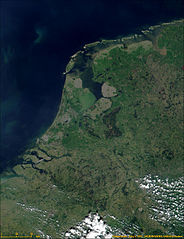 |
| The Netherlands/Wikimedia Commons |
It's not always easy to explain Dutch politics to those used to "winner takes all"- politics and a two party system, such as in the U.S.: "If you're not for us, you're against us", if that sounds familiar to you. Although this is not the place for an extensive explanation of Dutch politics, I'll try to summarize some of the key issues........
The Netherlands is governed through a parliamentary representative domocracy , ....................
whereby representatives to the parliament (i.e. the "Tweede Kamer" or Second Chamber with 150 seats) are voted for by the Dutch population in a representative manner: in other words if a party gains enough votes for one seat they will get one seat; if they gain enough votes for 40 seats, they will get 40 seats. There has never been a single party in Dutch history that has won the majority of seats. There have been and still are three leading parties representing the main political philosophies of the Netherlands: the centre-right Christian Democratic party ("CDA"), the left-wing labor party ("PvdA") and the conservative free-market liberal party ("VVD"). In addition there are a a number of other parties from left to right, which are represented in the Dutch parliament and also can play key roles in the government: the Dutch political system consists of a multiparty system in parliament - currently 11 parties - and a government which is a coalition of several parties, and is the result of coalition negotiatons among the parties that have performed well during the elections and led by the party which "won the election" by being the largest political party.
The 2010 elections were won by the "free-market" liberal VVD which won 31 seats. Their main left-wing opponent, the labor party, PvdA, won 30 seats. The historically strong party in the middle, the Christian CDA, lost half of its prior seats and ended up with 21 seats. The right-wing PVV, headed by the anti-immigration and anti-EU politician Geert Wilders (see also my prior post: "Geert Wilders Among Europe's Most Dangerous Politicians") won an overwhelming 24 seats (up from 9.) Due to the intrincities of Dutch coalition negotiations after the elections, no agreement among the leading parties to form a majority government could be reached. What resulted was a minority government formed by the VVD and CDA, headed by Prime Minister Mark Rutte, leader of the VVD, and supported in parliament by the PVV. From the beginning of this minority government tensions were visible among the three parties, especially stirred up by Geert Wilders' PVV. Wilders continuously expressed his personal views on many issues and when finally the budget had to be agreed upon, it was Wilders who, a bit suddenly, withdrew his party's support from this government, and forcing a new election to be held this month.
In another sign that the Dutch politics are no longer "business as usual" or based on status quo, a new power has emerged on the stage of Dutch politics. Even the British magazine The Economist noticed this and described in an article, The Dutch Election: Leftward Tilt the sudden rise of a far-left party:
"..... it is no longer Mr Wilders at centre stage: polls suggest his party will get only 18 of the 150 parliamentary seats. The spotlight has shifted to the far-left Socialist Party (SP), which may get as many as 38. The politician who has taken Mr Wilders’s place and quite a few of his voters is Emile Roemer, an eternally smiling man who casually shrugs off euro-zone rules on budget deficits and promises to preserve the generous Dutch welfare system...................
Mr Roemer shares his populist Eurosceptic and pro-welfare ideas with Mr Wilders, though his campaigning is more sophisticated. The SP is not against the European Union, but would slash its budget in half. Nor is it against the euro, only against excessively strict budget-deficit rules (and, by implication, against cuts at home to finance bail-outs abroad). Polls suggest that a considerable number of Mr Wilders’s voters are defecting to Mr Roemer’s camp..........
Even if Mr Roemer ends up winning the election, he may lose the political fight of building a coalition. Still, two things seem certain: the process will take a long time and the next government will be even more reluctant than its predecessor to support big euro-zone bail-outs paid for by fiscal austerity at home."
Well, in a week's time we'll know if Mr. Roemer's SP will win or not, but, as Dutch political history has taught us, even if he does win many seats, whether that will be enough to come out as a winner, let alone prime-minister during the coalition negotiations remains to be seen. In case he does end up as a winner, what would a leftward tilt mean for Dutch and European politics. Time will tell.
No comments:
Post a Comment